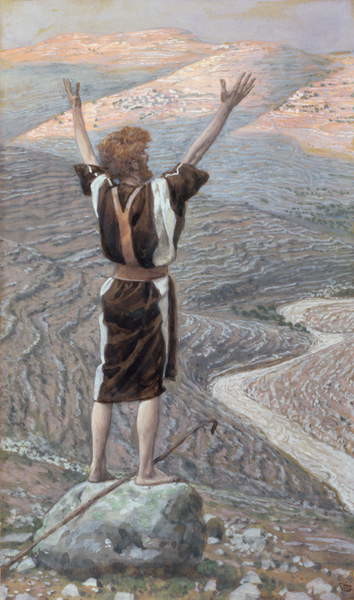
2nd Sunday of Advent C
Readings: Baruch 5:1‑9 ,Philippians 1:4‑6,8‑11, Luke 3:1‑6
The second and third Sundays of Advent always feature the ministry of John the Baptist, the herald who announces the coming of the Messiah. Today's readings are filled with joyful confidence because the time of salvation is dawning as "the word of God (is) spoken to John son of Zechariah in the desert." Let us pray, in the words of the responsorial psalm: "The Lord has done great things for us;/ we are filled with joy" (Ps 126).
In the first reading from Baruch, the desolate city of Jerusalem is commanded to cease its mourning and "put on the splendor of glory from God forever" because he is bringing her dispersed children back from the Diaspora. Like the high priest, Jerusalem is to wrap herself "in the cloak of justice," bear on her head "the mitre that displays the glory of the eternal name." This gathering of Jerusalem’s exiles is meant to be a revelation of God’s kingdom to the whole world. “For God will show all the earth your splendor:/ You will be named by God forever/ the peace of justice, the glory of God’s worship.” Jerusalem is commanded to “stand upon the heights” and witness the solemn procession of her scattered children returning to their homeland. “Up, Jerusalem! Stand upon the heights;/ look to the east and see your children/ gathered from the east and the west at the word of the Holy One,/ rejoicing that they are remembered by God./ Led away on foot by their enemies they left you/ but God will bring them back to you/ borne aloft in glory as on royal thrones.” In a second Exodus God has prepared a path for his people by commanding “that every mountain be made low,/ and that the age-old depths and gorges be filled to level ground,/ that Israel may advance secure in the glory of God” (see Isa 40:3‑5). He even orders “the forests and every fragrant kind of tree to overshadow Israel,” as he leads his people in joy “with his mercy and justice for company.”
Paul's prayer for the Philippians, in the second reading, continues the theme of waiting in joyful expectation. Despite his own imprisonment (see Phil 1:7,12‑26; 4:10‑20), Paul is filled with joy and gratitude because of the way the Philippians have "continually helped promote the Gospel from the very first day." He assures them that God "who has begun the good work in you will carry it through to completion, right up to the day of Christ Jesus." As they await the "harvest of justice," Paul prays that their "love" and "understanding" of "what really matters" will continue to grow "up to the very day of Christ."
Luke's account of the beginning of John the Baptist's preaching has a tone of joyful solemnity. Because of the universal significance of these events, the evangelist carefully dates them by specifying the Roman and Jewish rulers of the time. The day of salvation dawns at a very particular and portentous moment in history. Roman imperialism has absorbed the whole of the Mediterranean world, including Judea and Galilee, but only to serve God's purposes so that "all mankind shall see the salvation of God" (Lk 3:6; Isa 40:3‑5). Tiberius Caesar, Pontius Pilate, Herod the tetrarch of Galilee and Annas and Caiaphas are all destined to play roles in God's plan for salvation through Jesus.
John's proclamation of "a baptism of repentance which led to the forgiveness of sins" is also carefully linked to prophecy in the Hebrew Scriptures. The Book of Isaiah spoke of "a herald's voice in the desert" which would announce the return of Babylonian exiles to Jerusalem through the forbidding Arabian desert (see Isa 40:3‑5 and our reading from Baruch). Luke relates this passage to John's call for repentance in the desert region near the Jordan. In this context, Isaiah and Baruch’s imagery takes on the tone of a moral preparation which will culminate in God's salvation through Jesus. "A herald's voice in the desert, crying,/ `Make ready the way of the Lord,/ clear him a straight path./ Every valley shall be filled/ and every mountain and hill shall be leveled,/ the windings shall be made straight/ and the rough ways smooth,/ and all humankind shall see the salvation of God.’” In next week’s gospel we will hear John’s very concrete ethical teaching specifying how we may “make ready the way of the Lord.”


